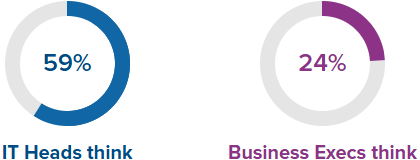Communicating the plan
The DX Leader serves as a “communication hub” that connects the various DX initiatives around the business, rationalizes and integrates the initiatives, and helps ensure they collectively move the digital business strategy forward.
What:
This module helps CIOs and other transformation leaders develop effective communications strategies that engage support for the new digital mission.
Why:
Getting buy-in from key stakeholders on all levels, from the board to the IT team is vital to their support of changes required for a true transformation and the continued growth and success of the organization.
How:
Tailoring your message to your audience, communicating key business outcomes, ensuring your team is all pulling the same direction and empowering them to speak are vital to effective communication on the transformation project..
Communicating transformation planning and progress involves the following steps:
- Establish a Communications Strategy
- Get Key Stakeholders on Board
- Embark on a Global Selling Campaign
- Communicate Directly to Your IT Staff
- Empower Your IT Staff to Communicate on DX
- Communicate Progress on New Digital KPIs Widely
